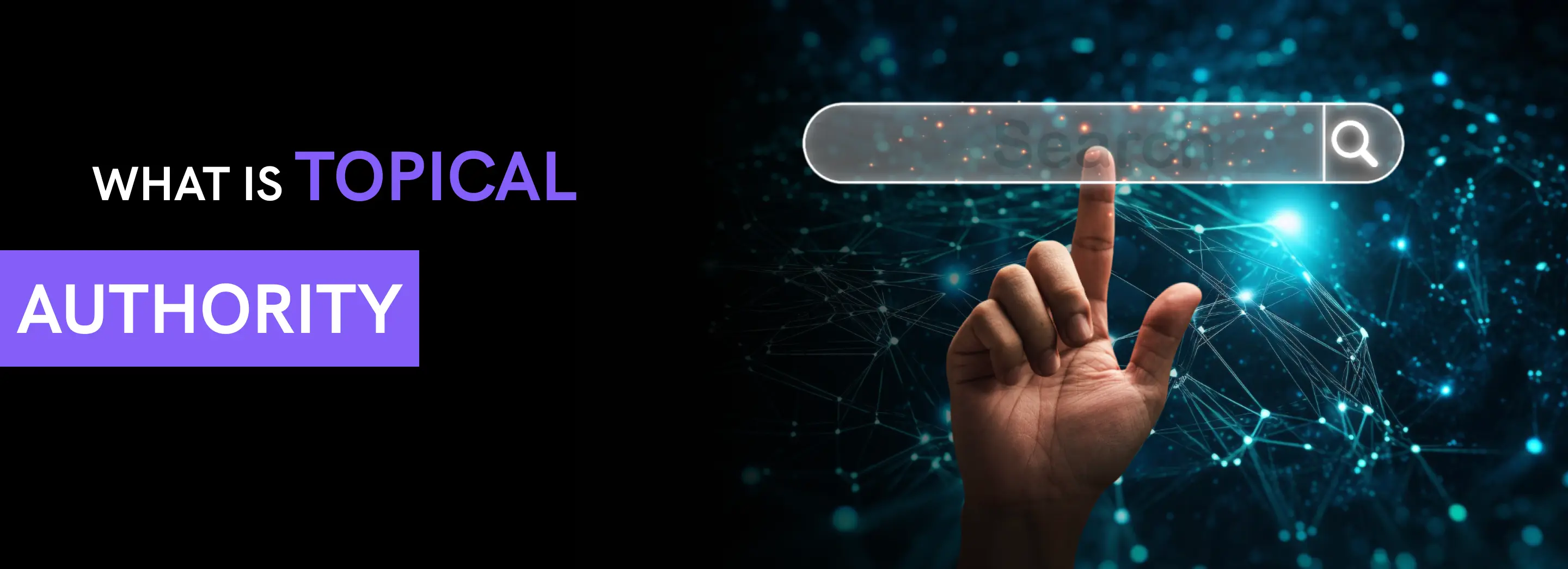Just being there and ranking for one or two keywords is no longer enough to stay ahead in today's competitive web environment. The idea of topical authority has thus come into being with the advancement of Google algorithms– a powerful SEO strategy that helps your website become the preferred online resource for certain subjects. What actually is topical authority, and how can you use it to garner attention and gain credibility for your website?
In this blog by BrandStory UAE, we will explain the term topical authority and then take you step-by-step through the actionable steps to optimize your site to become an authority in your area.
What Is Topical Authority?
Topical authority usually means the reputation of a website for its expertise and credibility around a particular topic or subject matter. It means that your site is not only publishing content around a keyword but is deeply knowledgeable about the entire topic landscape.
Google search engines use many signals to determine the authority of your site on a given subject matter or topic. If your website frequently posts in-depth, factual, and well-composed content about a certain subject, then search engines will likely rank your content highly and pass it on to users as a trusted source for information.
To help you understand, imagine: Would you trust a blog that wrote once about heart disease or one that has an extensive library of content on heart health, symptoms, treatments, expert interviews, patient stories, and the latest research updates? The latter has topical authority.
Why Does Topical Authority Matter?
Topical authority isn't just a buzzword; it’s central to the way search engines rank content today. Here's why it matters:
- Improved SEO Performance
The better topical authority your website builds, the better positions it will get on search engine results pages, hence higher domain authority and organic traffic. - Increased Trust and Engagement
Users are more prone to sticking to a website that consistently delivers value and depth. This increases the time on site, lowers bounce rates, and promotes return visits. - Content Clarity and Organization
Creating content with topical authority in mind leads to a better-organized website. This structure helps both users and search engines navigate your site effectively. - Edge Over Competitors
In a fairly crowded market, establishing topical authority therefore helps you distinguish the brand by making it a thought leader within the niche.
How to Build and Optimize Your Website for Topical Authority
Building topical authority comes only with time. It requires a strategic, long-term content and SEO plan. Here are some proven methods to help your website achieve topical authority:
1. Choose a Clear Niche or Core Topic
Start by identifying the main topic your business revolves around. For instance, if you're a digital marketing agency like BrandStory UAE, your core topics might include:
- SEO
- Content Marketing
- Social Media Strategy
- PPC Advertising
- Web Design & UX
Be specific and focused. Instead of trying to cover everything in the digital space, choose a well-defined segment and expand from there.
2. Conduct a Topical Map or Content Audit
A topical map is a visual outline of all the related subtopics and clusters under your main theme. For example, under "SEO," your topical map might include:
- Keyword Research
- On-page SEO
- Technical SEO
- Local SEO
- Link Building
- SEO Tools
- Algorithm Updates
Conduct an audit of your current content to identify what's missing, what can be improved, and how well your current articles interlink with one another.
3. Create Pillar and Cluster Content
This is the backbone of topical authority.Pillar content (also called cornerstone content) is a comprehensive guide or resource page targeting a broad topic.
Cluster content consists of supporting blog posts or pages that dive deep into subtopics related to the pillar content.
All cluster articles should link back to the pillar page and vice versa. Such internal linking enables Google to understand the depth of your content and the authority of your linked pages.
Example:
· Pillar: "The Ultimate Guide to SEO in 2025”
· Cluster: "Best Keyword Research Tools," "How to Optimize for Core Web Vitals," and "Top Local SEO Strategies for Small Businesses.”
4. Use Structured Data and Schema Markup
Adding schema markup makes search engines understand what your pages are all about. This improves the indexing of your content and enhances your chances of being included in rich snippets, FAQs, and featured results.
Some examples would be article schema for blog posts, FAQ schema for common questions, and breadcrumb for site structure.
5. Maintain Consistency and Content Depth
One high-ranking blog is not enough. To develop a topical authority, there must be consistent publication of high-quality content, covering various aspects of the core topic. Depth, utility, and distinctiveness are the foundation of Google's helpful content system.
Make sure your content includes:
- Comprehensive explanations
- Expert insights or quotes
- Original data or examples
- Multimedia like videos, charts, and infographics
6. Implement Smart Internal Linking
Strategic internal linking improves topical relevance and keeps users browsing through your content. Each time you publish a new piece, look for natural ways to link it to existing related articles.
For example, if your new blog is about "Voice Search Optimization," link it to your broader SEO pillar or another article about "Mobile SEO Trends."
7. Build Author Credibility and E-E-A-T
Google values content that comes from trustworthy, knowledgeable sources, especially in YMYL (Your Money Your Life) niches. E-E-A-T stands for:
- Experience
- Expertise
- Authoritativeness
- Trustworthiness
To boost E-E-A-T:
- Display author bios with credentials
- Cite credible sources
- Get backlinks from trusted websites
- Keep your content fact-checked and updated regularly
8. Track Your Progress With SEO Tools
Trace keyword rankings, content tracking, and domain authority using Ahrefs, SEMrush, or Google Search Console. This will allow you to make your topical map more focused and to spot content gaps.
Look for:
- Keywords where you rank in the top 10
- Pages getting high impressions but low clicks
- Topics where competitors outperform you
Refining your strategy based on data ensures continuous improvement and long-term authority.
9. Focus on User Intent and Search Behavior
Don’t just write for keywords: write for people. Understand the search intent: What is the user looking to achieve with their query? Are they trying to get information, buy something, or compare options?
Match your content to the user's journey:
- Informational: “What is digital marketing?”
- Navigational: “Best digital marketing agencies in Dubai”
- Transactional: “Hire digital marketing experts UAE”
The more your content aligns with user needs, the more it’s seen as authoritative.
10. Update and Repurpose Old Content
Content can become outdated, which negatively affects topical authority. Review your older posts every few months and update them with:
- Recent data or trends
- New internal/external links
- Improved readability and SEO performance
You can also repurpose old content into:
- Videos
- Infographics
- Social media posts
- eBooks or lead magnets
This multiplies your content’s reach while reinforcing your topical coverage.
Final Thoughts
Building topical authority is a slow and steady SEO strategy that places you as an industry leader over time. BrandStory UAE helps companies develop content strategies, applies SEO best practices, and creates compelling narratives that rank on the first page.
Your aim should never be to just rank on Google.
Your goal should be to establish yourself as an authority in your niche, a trusted destination where people in your niche find answers, solutions, or insights.
If you are ready to build your presence and gain unrestricted authority, let's work together. Reach out to BrandStory, a leading SEO agency in Dubai, your digital growth partner.
Need help with your content strategy or SEO optimization?
Contact BrandStory today and let us help you build your brand's topical authority from the ground up.
Related Blogs
.webp)
Digital Marketing Strategy Consultant Dubai: Strategy Before Scale
Digital Marketing Strategy Consultant Dubai helps businesses align SEO, paid ads, social media, and content into one structured growth plan built arou...

Digital Marketing for Dentists: A Complete Growth Blueprint
Most patients search online before choosing a dentist, which makes digital marketing essential for attracting new appointments. A strong digital marke...

Digital Marketing Packages in Dubai: The Complete Breakdown
Dubai’s business landscape moves fast. Whether you’re a startup in Business Bay, an e-commerce brand targeting the Gulf, or an established enterpr...

Digital Marketing for Real Estate Agents: Complete Growth Blueprint
The real estate market in the UAE is competitive, fast-moving, and highly digital. Buyers no longer walk into offices first- they search online. If...
.webp)
Local SEO Dubai: The Strategy Behind Winning Local Customers
Dubai is one of the most competitive business environments in the world. From restaurants in Jumeirah to law firms in DIFC and clinics in Dubai Marina...
.webp)
Search Engine Optimization (SEO) Services in Dubai: A Complete Guide for Businesses
In today’s competitive digital landscape, simply having a website is no longer enough. Businesses in Dubai and across the UAE must compete for visib...








